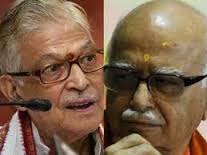New Delhi, Aug 27: The generational shift in BJP was complete today with its founders Atal Behari Vajpayee, L K Advani and Murli Manohar Joshi being dropped from the Parliamentary Board, the highest decision-making body, which has the stamp of Prime Minister Narendra Modi all over now.
In a token gesture, ailing Vajpayee and Advani and Joshi, for long the BJP's 'Trimurti', now figure in the new five-member 'Margdarshak Mandal' (guiding group) after being associated with the party for nearly four decades.
Three-time Madhya Pradesh Chief Minister Shivraj Singh Chouhan and party general secretary J P Nadda are the new entrants to the BJP Parliamentary Board which was reconstituted by newly-appointed chief Amit Shah.
The two have also been included in BJP's Central Election Committee, which decides on the party candidates to be fielded in elections.
The 12-member Parliamentary Board chaired by Shah now has Modi, Rajnath Singh, Arun Jaitley, Sushma Swaraj, Venkaiah Naidu, Nitin Gadkari, Ananth Kumar, Thawarchand Gehlot, Shivraj Singh Chouhan, Jagat Prakash Nadda and Ramlal as its members.
The new BJP President Amit Shah initiated the changes after consultations with top BJP leaders and Prime Minister Narendra Modi.
The five-member 'Margdarshak Mandal' also includes Modi and Rajnath Singh.
Vajpayee, who had faded away from public life since about a decade back due to his ill health, had however been retained as NDA Chairman. Advani was the Working Chairman of NDA before the Mori era.
The Central Election Committee was also reconstituted, with firebrand leader from Uttar Pradesh Vinay Katiyar being dropped.
Former BJP Mahila Morcha President Saroj Pandey, who was an ex-officio member of this Committee, has been replaced with Vijaya Rahatkar the new Mahila Morcha chief who was earlier the former Aurangabad Mayor.
Jual Oram, a Tribal face and union Tribal Affairs Minister, marks his entry into the 15-member body.
The other members of the CEC are Narendra Modi, Rajnath Singh, Arun Jaitley, Sushma Swaraj, Venkaiah Naidu, Nitin Gadkari, Ananth Kumar, Thawarchand Gehlot, Shivraj Singh Chouhan, Jagat Prakash Nadda, Ramlal and Shahnawaz Hussain besides Rahatkar
The restructuring of the BJP Parliamentary Board and its Central Election Committee heralds the generation shift in the party by infusing young blood.
The changes appear to be in line with the party's notional principle of having a cut-off age of 75 years which has been applied for inclusion of leaders in the Union Cabinet.
86-year-old Advani has shared an uneasy relationship with Modi in the recent past. He openly revolted when Modi was named as the chief of party's election Campaign Committee on June 9 last year and resigned from all key posts in protest. He took back the resignation a day later on persuasion by senior party leaders.
Several of BJP's other elder leaders who had contested the Lok Sabha elections have been appointed Governors. Among these include 82-year-old former Uttar Pradesh Chief Minister Kalyan Singh, 80-year-old Ram Naik, 79-year-old Keshari Nath Tripathi and Om Parkash Kohli, besides Gujarat Speaker Vajubhai Vala, Balramji Dass Tandon, Kaptan Singh Solanki and some others.





Comments
Add new comment